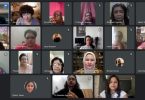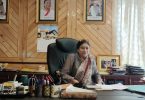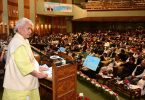Gnk English News Desk
21/05/2023

Resilient Voices of Contemporary African Women Writers
Dr Shalini Yadav
(Professor, Writer & Editor)
She upsurges from the shackles of her past,
The weight of her burdens she sheds at last.
With every step, she claims her place,
A force of nature, a power to embrace.
No longer a victim of society’s chains,
She breaks the norm, her future she reins.
In every facet of life, she strides ahead,
No longer silenced, no longer underread.
Women around the world have been the subject of discourse for centuries. From the earliest civilizations, ideas about women’s roles and responsibilities have been debated and contested. In the race to modernize, new ideas about women’s rights and freedoms have emerged, but old traditions and prejudices have also persisted. As a result, women’s identities and roles have been constantly evolving.
In the modern world, women are still fighting for equality. They are still fighting for the right to education, to work, to participate in government, and to live free from violence. They are still fighting for the right to be treated as full and equal human beings.
In The Second Sex, Simone de Beauvoir says- “If the feminine issue is so absurd, is because the male’s arrogance made it a discussion”.
The discourse on women is a complex and ever-evolving one. It is a discourse that is essential to the advancement of human rights and equality. It is a discourse that must continue until all women are free to live their lives to the fullest.
The discourse on women is a long and winding one, but it is a discourse that is moving in the right direction. Women are making progress in all areas of life, and they will continue to make progress until they achieve true equality.
Consequently, to add more, the present volume Contemporary African Women Writers dextrously edited by Dr Shalini Yadav brings forth qualitative research articles about contemporary African woman writers who have raised their voices against subjugation and efforted to create their own identity.
Contemporary African women writers face a number of challenges, including patriarchy, gender stereotypes, lack of access to education and resources, which are deeply entrenched in many African cultures, and it can make it difficult for women to be taken seriously as writers. Many African women do not have access to the same level of education and resources as men. This can make it difficult for them to become writers, as they may not have the time or money to devote to their writing. It reminds me the lines written by Virginia Woolf in A Room of One’s Own that “A woman must have money and a room of her own if she is to write fiction.” Women should be financially independent to think and voice.
Violence against women is also a serious problem in many African countries. This violence can make it difficult for women to feel safe and to express themselves freely. Despite these challenges, contemporary African women writers are producing outstanding work. Their writing is essential to understanding the continent’s rich history and culture and are helping to challenge patriarchy, gender stereotypes, and violence against women.
Some contemporary African women writers who are overcoming these challenges and making a difference are Chimamanda Ngozi Adichie, Aminatta Forna, Maaza Mengiste, Nadine Gordimer, Buchi Emecheta, Laila Lalami, Sarah Ladipo Manyika, Sefi Atta, Yaa Gyasi and their works often explore themes of race, identity, and family.
The two terms ‘Resilience’ and ‘Resistance’, the two most important capacities that an individual and a community should possess have been focused upon through some of the major characters like Adunni, Kike, Labake and Tia from Abi Dare’s novel The Girl With the Louding Voice. Various patterns of resilience and resistance power have been analyzed in the book ‘Contemporary African Women Writers’ explaining strategies how to adapt and overcome the physical and psychic imbalances in life.
Zaneta Varnado Johns, a contemporary poet and social activist in her article ‘Reflections on Female African American Poets’ talks about struggle for basic rights of African-Americans and the long overdue freedoms like voting, drinking at public water fountains, swimming in public pools, and attending better schools to make it a reality. She expressed her views about contemporary poets who serve as role models for the fearless voices of the future.
The book attempts to highlight about the sifted flow of freedom and the double oppression of women, presenting a depatriarchalized view on the novel The Purple Hibiscus, a quintessential African feminist novel that negates and upholds the female aesthetics of suffering and empowerment respectively.
In the article ‘Politics of Space and Colour in Helen Oyeyemi’s White is for Witching’ the story is analysed from a postmodern and black feminist perspective, and an attempt is made to find the elements of geographical displacement, territorial representation of colonization, mythological symbolism and consumption as linked to the post-colonial fear of reverse colonization and the African pursuit of identity and also assesses the racial discourse that underlies the entire novel.
Elizabeth Esguerra Castillo in her article ‘Pauline Elizabeth Hopkins’ Eugenic Vision-Inspired Fiction’ discusses how Pauline Elizabeth Hopkins’ works of fiction were greatly inspired by her eugenic vision that better breeding can improve the human race attributed to Charles Davenport, a famous eugenist.
The book also explores the problems of Black women who migrated from one country to another for studies and job, where they had to go through bitter experiences because of their colour and hair.
Harshita in her article ‘Overcoming Colonial Hegemony to Return to the Roots and Rebuild Identity in Gyasi’s ‘Homegoing’’ studies the destruction of identity and culture in the historical fictional novel Homegoing by Yaa Gyasi on the lines of the Gramscian theory of Hegemony and the agency the subalterns. Further it deals with the analysis of a decade-long process of the subaltern’s attempt to return to their roots, get known to their history and generate a discourse of their own with a new carved identity overcoming fear, guilt, oppression, and political hegemony.
The research articles are precisely apropos, distinctive and rational embracing each other with coherence to make the volume intact for the usage of it as an incomparable reference. The academicians and inquisitive researchers, who wish to investigate, study, analyze and pursue for significant resources and supportive details for their own arguments can refer the book and incorporate in their exploration.
The contribution of African Women Writers can not be relegated who have asserted to tell their own stories representing African women at global front. In the literary landscape, such assertive and resilient writers have provided space and encouragement for the portrayal of struggle and survival due to race and gender discrimination as emergent voices and torchbearers. I would like to quote here some ispiring lines of Maya Angelou’s poem ‘Still I Rise’:
Leaving behind nights of terror and fear
I rise
Into a daybreak that’s wondrously clear
I rise
Bringing the gifts that my ancestors gave,
I am the dream and the hope of the slave.
I rise
I rise
I rise.







